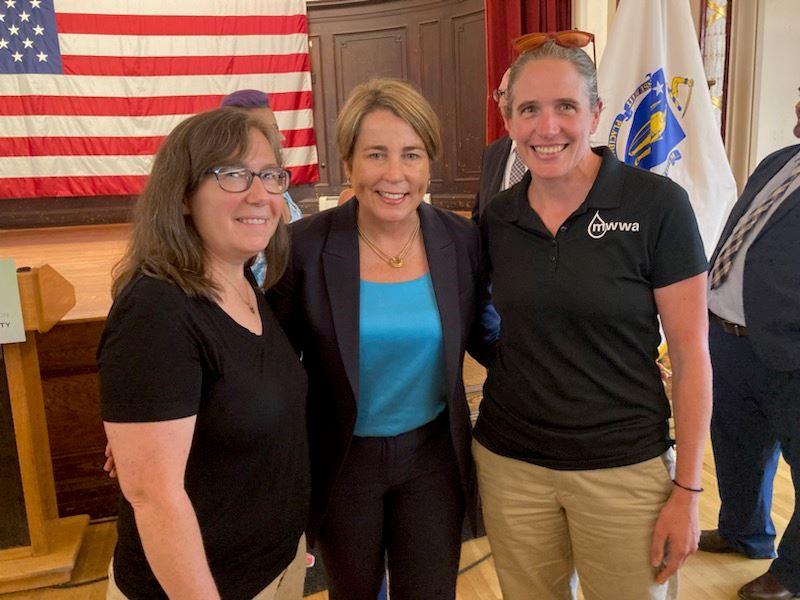Environmental Scientist Elizabeth Willson (left), Gov. Maura Healey (middle) and Assistant Superintendent of Public Works Amy Rusiecki (right).
Reminder Publishing submitted photo
AMHERST — The town of Amherst has entered the second phase of a crucial project relating to its climate resiliency goals.
In an announcement to the public, the town said that it has been awarded a Municipal Vulnerability Preparedness grant of a little under $1.2 million to improve flood resiliency and water quality in the Fort River watershed.
According to the town, the grant was part of the Healey-Driscoll administration award of $52.8 million to more than 70 projects across Massachusetts for climate resilience implementation and planning through the Executive Office of Energy and Environmental Affairs’ MVP Program.
“Fort River runs through central and south Amherst and is the longest free-flowing tributary of the Connecticut River in Massachusetts. It is critical that we recognize the important role it plays in flood resiliency,” said Town Manager Paul Bockelman in a statement. “This project will improve flood resiliency, and overall stream health including natural flow, water quality, and wildlife passage and habitat in three tributaries to the Fort River.”
The recent money will specifically be used to support the final design and construction cost to replace two culverts for stream crossing improvements.
“The existing culverts on Potwine Lane and Middle Street are very deteriorated and are causing sinkholes which are a hazard to the roads,” said Amherst Environmental Scientist Beth Willson in a statement to Reminder Publishing. “They are also undersized for current and future large storm events and are too small to promote wildlife passage. All these features will be improved with the proposed larger, concrete box stream crossings.”
The first phase of this project occurred in 2023 when the town was awarded a $169,250 MVP Action Grant to support designing and permitting the replacement of these damaged culverts. A third culvert was also a part of that first phase process, but Willson said that culvert, which is located on West Pomeroy Lane, is in a more complicated location and requires further design work.
“The MVP program chose not to fund the additional design for this location, so Amherst will look for another funding source,” Willson said of that third culvert.
According to the town, the broad goal of this project is to improve the resiliency of town infrastructure as climate change continues to occur locally and beyond. The town said they want to improve aquatic and terrestrial wildlife passage and improve the water quality and overall health of the Fort River for the public to enjoy into the future.
“We are pleased to have state support to fund work on replacing culverts, which will improve the overall health of the Fort River,” said Assistant Superintendent of Public Works Amy Rusiecki. “We worked hard to have a successful Phase 1 of this project, funded through the FY24 MVP Grant Program, and are proud that the state has decided to support this next phase.”
In its announcement, the town stated that Fort River is considered one of the most important watersheds statewide for the diversity of freshwater mussels and includes one federally endangered species. Its watershed contains all the reservoirs for Amherst, and the origin of the river itself is the Intake Reservoir in Pelham.



